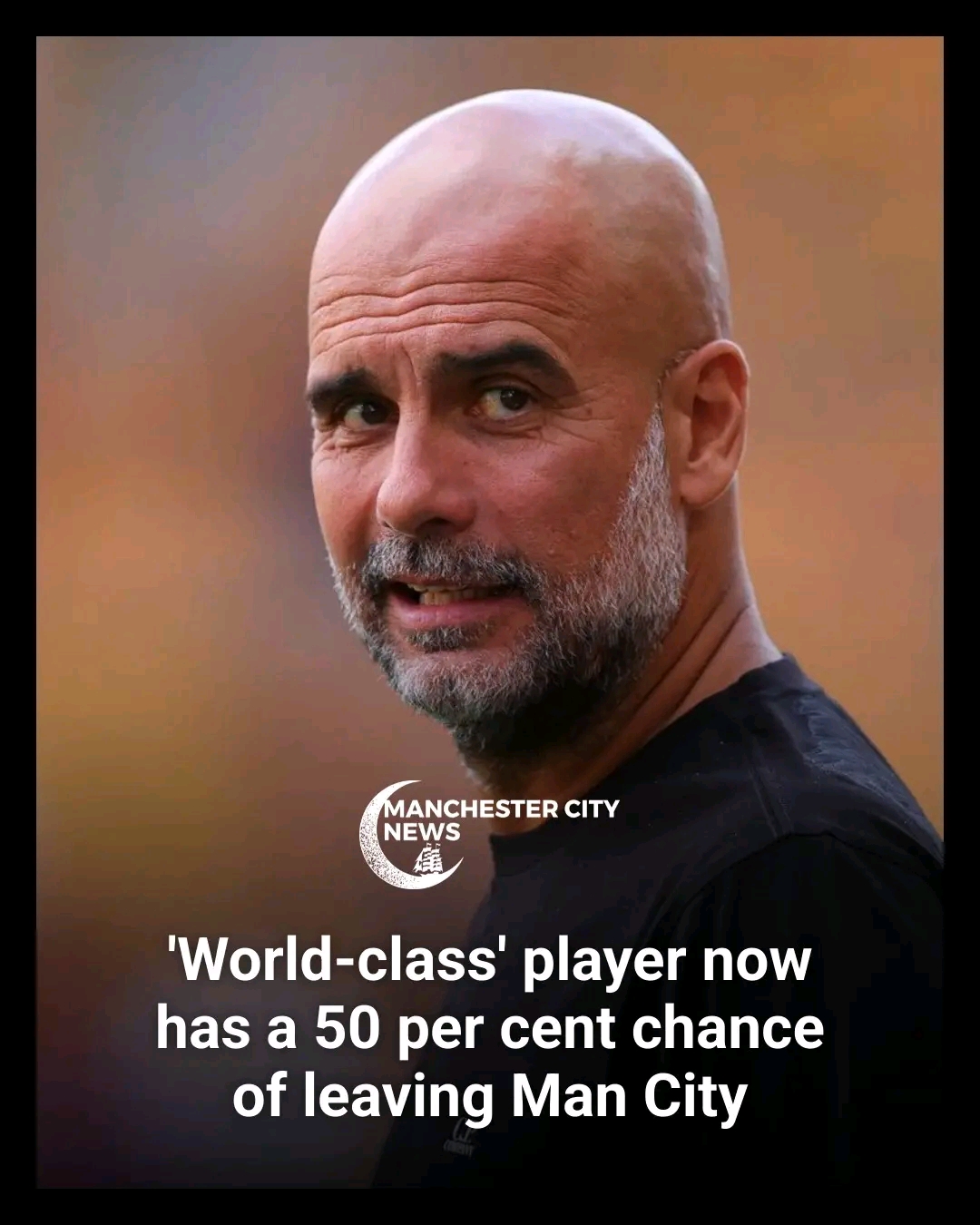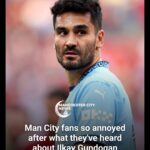World class player now have 50 percent chabxd of leaving man city

In the intricate tapestry of modern football, few stories capture the complexity of elite competition quite like Ilkay Gundogan’s current predicament at Manchester City. The German midfielder, who has been instrumental in the club’s most successful period in history, now finds himself at a crossroads that perfectly encapsulates the ruthless nature of top-level football and the difficult decisions that define careers at the sport’s pinnacle.
With a 50 percent chance of leaving the Etihad Stadium before the transfer window closes, according to respected journalist Christian Falk, Gundogan’s situation represents more than just another potential departure. It symbolizes the broader transformation occurring at Manchester City under Pep Guardiola’s revolutionary approach to squad management, where even the most decorated players must prove their relevance in an ever-evolving tactical landscape.
The 34-year-old midfielder’s uncertain future comes at a time when City are implementing one of the most significant squad overhauls in recent memory. Guardiola’s desire for a smaller, more cohesive group has created situations where players who have contributed enormously to the club’s success must now confront the possibility that their services may no longer be required. For Gundogan, a six-time Premier League winner and one of the most technically gifted midfielders of his generation, this reality is both professionally challenging and personally difficult to accept
To understand the significance of Gundogan’s potential departure, one must first appreciate his enormous contribution to Manchester City’s transformation from wealthy aspirants to serial champions. Since arriving from Borussia Dortmund in 2016, the German international has been far more than just a squad player; he has been an architect of the club’s most successful period, providing the technical excellence and tactical intelligence that have made City’s possession-based system so devastatingly effective.
Gundogan’s impact at City extends beyond mere statistics, though his numbers tell an impressive story. His ability to control tempo, create chances from deep positions, and score crucial goals has made him indispensable during the club’s period of dominance. Whether operating as a deep-lying playmaker, an attacking midfielder, or even occasionally in more advanced positions, his versatility has provided Guardiola with tactical options that have been crucial in solving complex strategic puzzles.
The German’s technical ability has been particularly valuable in City’s approach to breaking down defensive opponents. His vision and passing range have consistently unlocked stubborn defenses, while his timing in attack has produced match-winning moments in crucial fixtures. The fact that such a player now faces an uncertain future illustrates the depth of talent at City and the difficult decisions that come with managing a squad of world-class players.
Throughout his time at the Etihad, Gundogan has demonstrated remarkable consistency and professionalism, rarely complaining about rotation or tactical adjustments that have sometimes limited his playing time. His attitude and approach have made him a valuable mentor to younger players and a respected figure in the dressing room. These intangible qualities, while difficult to quantify, have been essential to maintaining the harmonious atmosphere that has characterized City’s most successful periods.
Sam Allardyce’s description of Gundogan as “world-class” reflects the broader recognition of his abilities throughout the football community. Coaches, analysts, and fellow professionals consistently praise his technical excellence, tactical awareness, and ability to influence matches through subtle but crucial contributions. This reputation makes his current situation all the more poignant, as it demonstrates how quickly circumstances can change in elite football
Gundogan’s uncertain position at City must be understood within the context of Guardiola’s evolving tactical approach and the emergence of younger players who offer different qualities. The Spanish manager’s system has undergone continuous refinement throughout his tenure, with each season bringing new tactical wrinkles and strategic adjustments designed to maintain competitive advantages over opponents who have studied and adapted to City’s methods.
The recent prominence of players like Nico O’Reilly, who was chosen ahead of Gundogan as a substitute against Wolves, illustrates how Guardiola’s priorities may be shifting toward younger players who can offer fresh energy and different tactical solutions. O’Reilly’s selection was particularly significant because it came in a match where experience and composure might have been expected to favor the German veteran.
This tactical evolution reflects broader changes in how modern football is played and the physical demands placed on players. The intensity of pressing, the speed of transitions, and the athletic requirements of Guardiola’s system may favor younger players who can sustain high-intensity performances over full seasons. While Gundogan’s technical abilities remain exceptional, questions about whether he can maintain the physical standards required for City’s demanding style may be influencing team selection decisions.
The emergence of other midfield options within City’s squad has also contributed to increased competition for places. Players who can offer similar technical qualities while providing additional pace, defensive work rate, or tactical flexibility may be preferred in Guardiola’s current system. This natural evolution of squad dynamics is a common feature of successful clubs, but it inevitably creates difficult situations for established players who must adapt or risk being marginalized.
Guardiola’s stated desire for a smaller squad adds another layer of complexity to Gundogan’s situation. In a reduced roster where every position carries greater responsibility and expectations, the Spanish manager may prefer players who can contribute across multiple roles or who represent the future rather than the past. This strategic consideration, while understandable from a long-term planning perspective, creates immediate challenges for players like Gundogan who have contributed enormously to past success.
Christian Falk’s revelation that Gundogan can “imagine” a return to the Bundesliga adds an intriguing dimension to his potential departure from Manchester City. Germany’s top flight represents familiar territory for the midfielder, who established his reputation at Borussia Dortmund before making his move to Manchester. A return to German football could offer several advantages, including reduced travel demands, familiar tactical approaches, and the opportunity to play closer to family and friends.
The Bundesliga’s tactical characteristics might also suit Gundogan’s current stage of career development. German football’s emphasis on technical excellence, positional play, and tactical discipline could provide an ideal environment for him to continue performing at the highest level while potentially extending his career. The league’s competitive balance and the presence of several clubs capable of competing in European competition could offer him the platform to continue winning trophies while taking on new challenges.
Several Bundesliga clubs would undoubtedly be interested in acquiring a player of Gundogan’s caliber and experience. His knowledge of German football, combined with his international experience and proven track record of success, would make him an attractive proposition for clubs seeking to strengthen their midfield options. The financial aspects of such a move could also be appealing, as German clubs might be able to offer competitive packages while providing him with a prominent role in their tactical systems.
The psychological aspects of a potential Bundesliga return should not be underestimated. For a player facing uncertainty about his role at City, the prospect of returning to a league where his abilities are well-understood and highly valued could provide the confidence boost necessary to extend his career at the highest level. The familiarity of German football culture, language, and tactical approaches could ease the transition and allow him to focus purely on his performance.
However, a move back to Germany would also represent a significant step down in terms of global profile and competitive intensity. While the Bundesliga remains a high-quality league, it lacks the depth and competitiveness of the Premier League, potentially raising questions about whether such a move would represent the beginning of the end of Gundogan’s career at the very highest level of European football
The mention of Serie A as another possibility for Gundogan opens up different tactical and cultural considerations that could influence his decision-making process. Italian football’s emphasis on tactical sophistication, positional play, and technical excellence could provide an ideal environment for a player of his abilities to continue performing at the highest level while experiencing a new footballing culture.
Several Serie A clubs would benefit enormously from Gundogan’s experience and technical abilities. Teams like Juventus, Inter Milan, AC Milan, or even ambitious clubs like Napoli or Roma could offer him the opportunity to compete for domestic titles and European qualification while playing in a league that has traditionally valued older, experienced players who bring tactical intelligence and leadership qualities.
The tactical demands of Serie A might actually suit Gundogan’s current stage of career development better than the intense physical requirements of the Premier League. Italian football’s emphasis on positioning, timing, and tactical awareness could allow him to maximize his strengths while minimizing the impact of any physical decline. The slower pace of the league, combined with its tactical complexity, could provide the perfect environment for him to continue contributing at the highest level.
From a cultural perspective, a move to Italy would represent a significant adventure for Gundogan, offering him the chance to experience one of football’s most storied leagues while immersing himself in a different footballing philosophy. The lifestyle changes associated with living in Italy, combined with the opportunity to learn new tactical approaches, could provide the mental stimulation necessary to maintain his motivation and performance levels.
The financial aspects of a potential Serie A move could also be attractive, with Italian clubs potentially able to offer competitive packages while providing guaranteed playing time and a central role in their tactical systems. The league’s growing global profile and improving competitive standards could also ensure that he remains visible on the international stage while building toward potential coaching opportunities in the future.
While Christian Falk suggests that Galatasaray is not currently a “hot topic” for Gundogan, previous reports have indicated that the Turkish giants represent his “dream club,” adding another layer of complexity to his decision-making process. The Istanbul-based club’s rich history, passionate fanbase, and ambitious project could offer unique attractions that extend beyond purely footballing considerations.
Turkey’s growing football profile, combined with Galatasaray’s European ambitions, could provide Gundogan with the opportunity to become a central figure in an exciting project while experiencing a completely different football culture. The club’s recent investments in infrastructure and player recruitment suggest serious ambitions to compete at the highest levels of European competition, potentially offering him the chance to contribute to something special while enjoying a prominent role.
The cultural and personal aspects of a potential move to Turkey should not be underestimated. Gundogan’s Turkish heritage through his parents could make such a move particularly meaningful on a personal level, allowing him to connect with his roots while continuing his professional career. The lifestyle changes associated with living in Istanbul, one of the world’s great cities, could provide the kind of adventure and stimulation that might appeal to a player seeking new challenges at this stage of his career.
However, the competitive level of Turkish football would represent a significant step down from the Premier League, potentially raising questions about his ambitions and motivations. While Galatasaray regularly competes in European competition and faces quality opponents, the overall standard of the Turkish league would not provide the same level of challenge that has characterized his career to this point.
The financial aspects of a potential Turkish move could be attractive, with clubs in the region sometimes willing to offer substantial packages to attract high-profile players. However, such considerations would need to be balanced against the potential impact on his international career and long-term reputation within the football community.
Gundogan’s contract situation adds urgency to his current predicament, with only one year remaining on his deal with Manchester City. This timeline creates pressure for all parties involved to reach decisions quickly, as the club will want to avoid losing such a valuable asset on a free transfer while the player will want clarity about his future to properly plan the next phase of his career.
From Manchester City’s perspective, Gundogan’s contract situation presents both challenges and opportunities. If they believe he still has a significant role to play in their future plans, they will need to decide whether to offer him a contract extension or risk losing him for nothing next summer. However, if Guardiola’s tactical evolution means his services are no longer required, allowing him to leave now could free up wages and squad space while potentially generating a modest transfer fee.
The financial implications of Gundogan’s potential departure extend beyond immediate transfer considerations to broader questions about squad investment and resource allocation. His wages represent a significant portion of City’s salary budget, and redirecting those resources toward younger players or different positions could align with Guardiola’s vision for a smaller, more focused squad.
For potential suitors, Gundogan’s contract situation makes him an attractive proposition, as his relatively low transfer fee would allow clubs to invest more heavily in his wages and provide him with a more attractive package. This dynamic could work in his favor when negotiating with interested parties, potentially allowing him to secure favorable terms while joining a club that truly values his contributions.
The timing of any potential move is also crucial, with the transfer window closing soon and clubs needing to finalize their squad planning for the coming season. This pressure could accelerate decision-making processes and potentially influence the terms of any agreement, as all parties will want to avoid being left in uncertain situations as the window closes.
Pep Guardiola’s decision not to use Gundogan as a substitute against Wolves, preferring instead to introduce Nico O’Reilly, sent a clear message about his current thinking regarding squad selection and future planning. This tactical decision, while seemingly minor, carries significant implications for understanding how the Spanish manager views the German’s role in his evolving system.
Guardiola’s philosophy has always emphasized the importance of every squad member feeling valued and having genuine opportunities to contribute. His stated desire for a smaller squad reflects his belief that maintaining large rosters creates unhappiness among players who rarely feature, ultimately undermining team harmony and collective performance. In this context, allowing experienced players like Gundogan to leave could be seen as an act of kindness rather than ruthless disposal.
The Spanish manager’s tactical evolution throughout his time at City has consistently involved difficult decisions about player retention and recruitment. His willingness to move on from successful players when he believes change is necessary has been a hallmark of his career, from his time at Barcelona through his periods at Bayern Munich and now Manchester City. This consistency suggests that his approach to Gundogan’s situation reflects broader strategic thinking rather than personal considerations.
From Guardiola’s perspective, the emergence of younger players like O’Reilly represents an opportunity to inject fresh energy and different tactical solutions into his system. These players, while less experienced, may offer attributes that align better with his current tactical requirements, including pace, work rate, and the ability to adapt quickly to new instructions.
The manager’s approach to squad management also reflects his understanding of the psychological dynamics involved in maintaining a competitive environment. By providing clear signals about player expectations and future roles, he allows individuals to make informed decisions about their careers while avoiding the kind of prolonged uncertainty that can damage both individual morale and collective team spirit.
Gundogan’s potential departure must be understood within the broader context of Manchester City’s ongoing squad transformation, which has already seen several significant changes and appears likely to involve additional departures before the transfer window closes. The club’s willingness to allow experienced, successful players to leave reflects their confidence in their ability to maintain competitive standards while implementing Guardiola’s vision for a more streamlined operation.
The departure of players like Kevin De Bruyne, whose contract has been allowed to expire, demonstrates that no individual, regardless of their historical contributions, is exempt from the club’s strategic planning. This approach, while potentially risky in the short term, reflects a belief that systematic changes are necessary to maintain competitiveness in an evolving football landscape.
Manuel Akanji’s situation, with Galatasaray reportedly offering him a contract, illustrates how multiple players are facing uncertainty about their futures at City. This simultaneous evaluation of several squad members suggests a comprehensive review of personnel rather than isolated decisions about individual cases. Such an approach allows the club to consider how different departures might interact and affect overall squad balance.
The emergence of younger players throughout City’s system provides the foundation for these potential departures, as the club’s faith in their development programs allows them to consider replacing experienced internationals with promising academy graduates. This strategy, while risky, could provide long-term benefits by reducing wage costs while maintaining competitive standards.
The financial implications of multiple departures could be significant, potentially freeing up substantial resources for investment in targeted areas where improvements are needed. However, the risk of losing too much experience simultaneously could also create vulnerabilities that opponents might exploit, requiring careful management of the transition process
Any decision about Gundogan’s club future will inevitably have implications for his international career with Germany, where he remains a valued contributor despite his advancing years. The level of competition he faces at club level could influence his ability to maintain the standards necessary for international selection, particularly with younger German midfielders emerging and competing for places.
A move to a less competitive league could potentially impact his international prospects, as national team coaches often consider the quality of opposition faced when making selection decisions. However, his experience and proven track record might provide some protection against such concerns, particularly if he continues performing well regardless of the league in which he plays.
The psychological aspects of his club situation could also affect his international performances, as uncertainty about his future might impact his confidence and form. Resolving his club situation quickly, regardless of the outcome, could provide the clarity necessary for him to focus fully on his international responsibilities during upcoming fixtures and tournaments.
Germany’s tactical system and the role he plays within it might also influence his club decision-making, as he may prefer to join a team whose style of play complements his international responsibilities. This consideration could favor moves to clubs that emphasize technical excellence and positional play rather than purely physical approaches.
The long-term implications for his international legacy will depend partly on how he manages this transitional period in his career. Successful adaptation to new challenges could enhance his reputation and potentially extend his international career, while struggles with change could accelerate his decline at both club and international levels.
At 34 years of age, Gundogan faces the universal challenge that confronts all elite athletes: adapting to physical decline while maintaining competitive standards. His technical abilities remain exceptional, but the physical demands of modern football continue to increase, creating pressure to evolve his game and find new ways to contribute effectively.
The psychological challenges of potentially leaving Manchester City, where he has enjoyed enormous success and built strong relationships, should not be underestimated. The comfort and familiarity of established routines, tactical systems, and personal connections can be difficult to replicate in new environments, particularly for players in the latter stages of their careers.
However, the mental stimulation of new challenges could also provide benefits, reinvigorating his motivation and providing fresh perspectives on his game. Many experienced players have found that changes of environment, while initially challenging, ultimately extended their careers by forcing them to adapt and discover new aspects of their abilities.
The physical demands of different leagues vary significantly, and Gundogan’s decision might be influenced by his assessment of where he can best manage the transition from peak physical condition to a more experience-based approach to performance. Some leagues and tactical systems are more accommodating to older players, potentially allowing him to extend his career while maintaining high standards.
The support systems available at different clubs could also influence his decision, as access to quality medical staff, training facilities, and sports science resources becomes increasingly important for players managing the challenges of aging in elite sport. These practical considerations, while less glamorous than tactical or financial factors, could ultimately prove decisive in his choice.
The football transfer market’s current dynamics create both opportunities and challenges for a player in Gundogan’s position. While his experience and proven track record make him attractive to many clubs, the financial constraints facing much of the football industry limit the number of potential destinations that can offer competitive packages.
The timing of his availability also affects market dynamics, as clubs have already completed much of their summer recruitment and may have limited resources available for additional signings. However, his quality and experience could convince clubs to adjust their plans if they believe he represents exceptional value or can solve specific tactical problems.
Competition from other available players in similar positions could influence both the interest he receives and the terms offered by potential suitors. The transfer market’s interconnected nature means that decisions made by other players and clubs could significantly impact his options and the timeline for reaching agreements.
The global reach of modern football means that clubs from various leagues and continents could potentially compete for his services, creating opportunities but also complicating decision-making processes. Each potential destination offers different advantages and challenges, requiring careful evaluation of sporting, financial, and personal factors.
The role of agents and intermediaries in facilitating discussions and negotiations becomes particularly important in complex situations involving multiple potential destinations. These professionals’ relationships and expertise could prove crucial in identifying opportunities and structuring agreements that satisfy all parties involved.
Professional football decisions at this level inevitably involve consideration of family circumstances and personal preferences that extend beyond purely sporting factors. Gundogan’s family situation, including the needs and preferences of his spouse and children, could significantly influence his decision-making process regarding potential destinations.
Educational opportunities for children, healthcare systems, language barriers, and cultural adjustment all represent practical considerations that become increasingly important for experienced players who have already achieved significant success and financial security. These factors might favor certain destinations over others, regardless of sporting considerations.
The social and cultural environment of potential destinations could also influence his decision, as the quality of life and community integration opportunities become more important for players seeking long-term stability rather than short-term career advancement. Some locations might offer advantages in terms of lifestyle, climate, or cultural amenities that enhance overall family satisfaction.
Professional development opportunities for his spouse and family members might also factor into decision-making, as successful professional footballers often consider the broader impact of relocations on all family members rather than focusing solely on their own career needs.
The proximity to extended family and existing social networks could also influence his preferences, particularly if potential destinations allow for easier maintenance of important personal relationships or provide access to familiar cultural and social environments.
Gundogan’s potential departure from Manchester City would mark the end of an era that has seen him contribute to some of the most successful periods in the club’s history. His role in their Premier League triumphs, domestic cup victories, and Champions League success has secured his place in the club’s hall of fame regardless of how his departure is ultimately managed.
The manner of his exit could influence how his contributions are remembered and celebrated by City supporters and the broader football community. A respectful, mutually beneficial separation would allow both parties to focus on positive memories and future opportunities rather than dwelling on disappointment or controversy.
His legacy at City extends beyond trophies and statistics to include his influence on younger players, his professionalism during difficult periods, and his adaptation to various tactical roles as required by team needs. These intangible contributions often prove more enduring than specific performance metrics and could enhance his reputation within the football community.
The historical context of his career transition also matters, as the modern game’s evolution toward youth and athleticism creates challenges for experienced players that differ from previous generations. His ability to navigate this transition successfully could provide insights and inspiration for other players facing similar situations.
The broader implications of his career choices at this stage could influence how other experienced players approach similar decisions, potentially establishing precedents for managing the later stages of elite football careers in an increasingly demanding and competitive environment
As Ilkay Gundogan contemplates his future with a 50 percent chance of leaving Manchester City hanging in the balance, he faces one of the most significant decisions of his distinguished career. The choice between remaining at the Etihad Stadium and embracing new challenges elsewhere will define not only the next phase of his playing career but also how his contributions to one of football’s most successful periods are ultimately remembered.
The complexity of his situation reflects the broader challenges facing elite football in an era of rapid change and evolution. Players who have achieved enormous success must now adapt to new realities where past achievements provide no guarantees of future opportunities, and tactical evolution can quickly render previously valuable skillsets less relevant to team needs.
Guardiola’s approach to squad management, while potentially difficult for individual players, reflects a philosophical commitment to continuous improvement and adaptation that has characterized his most successful periods as a coach. His willingness to make difficult decisions about experienced players demonstrates the kind of strategic thinking that has made him one of football’s most successful managers.
For Gundogan, the decision ultimately comes down to balancing sporting ambition with personal fulfillment and family considerations. Whether he chooses to fight for his place at City, embrace new challenges in the Bundesliga or Serie A, or pursue his dreams in Turkey, the choice will reflect his priorities and vision for the remainder of his career.
The football community will watch his decision with great interest, recognizing that it represents more than just another transfer saga. It embodies the eternal tensions between loyalty and ambition, experience and youth, comfort and challenge that define elite sport and create the compelling narratives that capture public imagination.
Whatever Gundogan ultimately decides, his legacy as one of the most technically gifted and successful midfielders of his generation remains secure. His contributions to Manchester City’s golden era will be remembered long after his final appearance in a City shirt, and his next chapter, wherever it unfolds, will be approached with the professionalism and excellence that have characterized his entire career.
The coming days will reveal whether this distinguished midfielder will continue his journey at the Etihad or begin a new adventure elsewhere, but regardless of the outcome, his story will continue to inspire and influence the next generation of players navigating the complex landscape of modern elite football.















